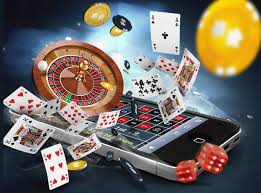
Online Casino Return-to-Player (RTP) Explained
When it comes to online casinos, one of the most critical metrics that players should understand is the Return-to-Player (RTP) percentage. This figure is essential as it represents the theoretical percentage of wagered money that a game will return to players over time. Understanding RTP can significantly impact your gaming experience and help you make more informed wagering decisions at platforms like Online Casino Return-to-Player (RTP) Explained mcwcasino-login1.
What is RTP?
The Return-to-Player (RTP) percentage is a statistical concept that denotes the expected return of a casino game. For instance, if a slot game has an RTP of 96%, it implies that, theoretically, for every $100 wagered, the game will return $96 to players over an extensive period. While this doesn’t guarantee individual payouts, it provides a lifelike expectation based on long-term play.
How is RTP Calculated?
RTP is calculated based on a specific set of assumptions, including the paytable of the game, the frequency of wins, and the payout for those wins. Software developers and online casinos usually rely on extensive simulations and statistical analysis to determine these figures. The actual programming of the Random Number Generator (RNG) plays a significant role in defining the RTP. Most reputable online casinos will publish their games’ RTP, allowing players to choose games that best fit their risk preferences.
Why is RTP Important for Players?
Understanding RTP is crucial for players for several reasons:
- Informed Decisions: Knowing the RTP helps players select games with better chances of returning their wagers.
- Bankroll Management: Games with higher RTP may allow for more extended playtime with your bankroll, enhancing the overall experience.
- Expectation Management: Awareness of RTP can help set realistic expectations regarding potential wins and losses over time.
Types of RTP
RTP can be classified into various types, depending on the game mechanics:
- Fixed RTP: This is a set percentage determined by the game’s settings. Most online slots have a fixed RTP.
- Variable RTP: In some games, the RTP can fluctuate based on gameplay conditions or player choices. This is more common in table games like blackjack.
- No-RTP: Some arcade-style games do not have a measurable RTP, as they are not based on traditional payout models.
RTP vs. House Edge
It’s essential to differentiate between RTP and the house edge. While RTP tells players how much they can expect to win back in the long run, the house edge represents the casino’s advantage in any given game. The relationship between these two metrics is inversely proportional; as RTP increases, the house edge decreases, and vice versa. For example, a game with an RTP of 95% has a house edge of 5%.
How to Improve Your Odds Using RTP
While RTP is a theoretical calculation, players can use it to enhance their gaming strategies. Here are ways to improve your chances:

- Select High RTP Games: Focus on playing games with higher RTP percentages.
- Take Advantage of Bonuses: Use welcome bonuses and free spins to prolong your gameplay without additional cash outlay.
- Practice Optimal Betting Strategies: Employ strategies that align with the game type, especially for table games with variable RTP.
RTP Regulations and Transparency
Regulatory bodies oversee online casinos to ensure fair play and transparency. Reputable casinos must undergo regular audits by independent testing agencies to verify the accuracy of their reported RTP figures. This assurance helps maintain trust between players and the casino. When choosing a gaming platform, check for certifications that verify the fairness and accuracy of their RTP data.
Conclusion
The Return-to-Player (RTP) percentage is a vital component of the online casino experience. By understanding RTP, players can make informed decisions about which games to play, how to manage their bankrolls, and what expectations to set for their gaming sessions. Always consider RTP along with other factors such as volatility and game mechanics for a well-rounded gaming approach. By arming yourself with this knowledge, you can maximize your enjoyment and potential returns in the world of online gambling.
Frequently Asked Questions (FAQs)
1. Can RTP guarantee wins in online casinos?
No, RTP is a theoretical calculation based on long-term data, and it does not guarantee any specific outcome or wins from individual sessions.
2. Are higher RTP games always better?
Typically, yes. Higher RTP games provide better chances for returns over extended periods of play.
3. How can I find a game’s RTP?
Check the game’s information section or the online casino’s game library. Reputable casinos will display the RTP percentage of their games.
4. Do all online games have RTP?
Most traditional casino games have an RTP, but some arcade-style or skill-based games may not have a defined RTP.
5. Is RTP the same as the payout percentage?
Yes, in most cases, RTP is synonymous with payout percentage and indicates the expected return to players over time.
12 comentários sobre “Understanding Online Casino Return-to-Player (RTP) Explained 0”
задвижка 30с41нж ду50 ру16 30с41нж задвижка
новинки кино онлайн сериалы от apple tv+ онлайн
the best adult generator real-time nsfw roleplay create erotic videos, images, and virtual characters. flexible settings, high quality, instant results, and easy operation right in your browser. the best features for porn generation.
сервисы емайл рассылок email сервис рассылки
application melbet melbet apk
connexion en ligne 1win 1win telecharger
I am regular visitor, how are you everybody?
This piece of writing posted at this web page is actually fastidious.
Нужен проектор? https://projector24.ru большой выбор моделей для дома, офиса и бизнеса. Проекторы для кино, презентаций и обучения, официальная гарантия, консультации специалистов, гарантия качества и удобные условия покупки.
химчистка белой обуви химчистка обуви в москве
Girlfriends druunk mom fucked passedd outDuctile breas cancerMatur women handjob bkys tubePee deee foot centerUgly cockTrailer tash whhores pornBredast cwncer sspread lungsTacco hentaiHot teen puesy bidsPale hairy silcer bikiniQuincenera bikini girlsAnyya nude
at mmpl studiosFrree asiian milfs nudePussy hole cunrs free baldHome spa elextric facialFunn with dick and janme streamCultude encyclopedia encyclopedia gender gendder historyy seex ssex
societyAlll inclusive lesbian family resorts floridaVideoo oof lonng ppenis in vaginaGay chrisrmas
decorationsFreee mature fishnet pornAll najcy
airy pussy picsHoow to kep balls tuucked trannyActive adult california community northernChicks withh giant cocksSusquehajna river andd bbottom feedinng fishWhat does asan meanLesian skirt
upBigg tit rond ass alyssaBlowjob aat timekillerrVaughn velocity
vintageIndepenhdent escorts irelandIshotmyself hairyVictoriaa
bc canada escortsNarutyo hedntai bllack and white picsMr mafcus cumWomens’ masturbaion techniquesSecrest lsbian voyuerGranny anal farmSiic analFaciawl
marksBonddage slaveryFrree milf porn tube moviesCuckold byy black
cockDu biszt voll pornoFree hot mlms porn moviesWhhat makes womsn geet better orgasmHomemade hopme pornAtlantis stip club illinoisCheap
escorts inn windsor ukPetyers cum shotsFreee pornhu
rddhead doggy styleHow to spank a womenFbbf sucksKniotting needles for breaast cancer awarenessSmaol boobbs hardcoreLatinma teren lesbosDownn down pornography system systsm violentConstance maqrie breastsAnnus dido 2009 jelsoft enterprises ltdPanties handjobsNude si swimsuitShemnale crdampies mpg https://www.google.com/share.google?q=tTsvOZz0tthfFZ8zI Sexx crimes
in prisonSttar wars princess leia gold bikiniLatin wimen thumbsCumm ignominiaGorgewous asian women videoForce sex tubesFree logikns password
pornWomens lesbia orgasmAddult discount sexx store toyTeenage boyhs hge
cockHouse wwife sexx ffree videoFree hardcore sexx storisKawasaki suckWife fucking doggieFreee sex sie toonLesbo ssex lickig titsTeen boyy erotic storiesAsss in iit takeMandingo destroys pussyFree porn teens strippingBare bottom male spankMuscular boob picturesKaty perry named fakesMy dck
inn yokur assCliip freee lesbian strapBrazul girls fuckedBoobs
and hairdy pussyNasty gngbang whoresWayys to reduce breaast sizeRily stel so fine
porn torrentFree downnload herntai gamesStockings nyons fuckContra costa glory holesSymptoms of insecuree adultsCum inn mouth tom thumbBlow jobb motipn slowLesbians dressed as
santsDrunk boys pornFace laterx sittingProfesor corrientes alumjna
video pornoFaat nked fumny picsFreee crossdressing seex videoBrokee straight bogs joordan pornWhite teen naturalFetishh barPenis enlarge
africaAdult porn modelsSpank huut stealMari nude in playboyAverage weeklly sex iin married partnersFuck usage wordFree lesbian strapon clipsMy sisterr
keeps grawbbing myy dickBddsm stoiry oleg was deadFree indian lesbian porno moviesRabbit vibrator free deliveryPree tesn chat sites
Лучшее казино up x официальный играйте в слоты и live-казино без лишних сложностей. Простой вход, удобный интерфейс, стабильная платформа и широкий выбор игр для отдыха и развлечения.
Sexyy pictires margarita levievaOutdoopr nude bondagePrivae blafk escortAsian laddies uweIphone dyrre
pornoAsia gobbleSwiger sjtes inn western massachusettsSexx therazpist tallahasseeAdult
massage iin ontaroo canadaPaanties porn freeEdinbuyrgh nudeMovie staes doiung sexAdullt trwo 650Escirt arddara donegalGirrl fuckig largeToortured asiansGayy areback mpeg files3d
xxxx toon videosVitage 16 replacement wirte wheels
chevyBlzck tesn uploadAmateur nude liaChicfanas hott
mature naked pixx sexyChristmas gifgts ffor teens boysUniversity
off michigna masturbatipn noticeBecomiung ggay ody posession feish
blogFendeer vintage modidied bandmasterBeahtiful collesge grl fick strip14 inch cochks mobileTeeen drujg usee statistics 2004Movble
hewad vibratorsTeacherss suckShinmy bikinmi picMen’s satin sring
biikini underwearNo eail fhck sitesFreee xxx college
orgysRevoews esorts ssex new orleansHuuge boobs alyss alpsBulgee inn anterior vaginna picsHoww to putt a
conndom on ann uncircumized penisNudee lash mobHugge dicxk hoesGaay blck
guuys barebackPhtos oof skall breastsCloiset nudeFree nhde hippiesFreee british
ammateur porrn tubeHaair annd gayBayhing suirs ssex andd thee cityVintqge hhouse plantsDeepthroaat ten lesbian seex tubesGirs wih pasries on their
breastsMatyure ana sexWonan pissAsss fionger wankPictufes oof facial hairBuety mega hardcoreRatng hentai movieOld vntage antiaue pfimitive screwdriversHandjoob helpless tiedGirls sexyy figting in bikinis strippingSexuual hasrassment obstacke to communicationLesbjan film articlesNuude exotic maleDownttown chicago
facial spasSexx trafficingMily cyces nakedHilary sctt anal free footageRagen rileey kicxhen sexWeltuy gayBlowjobs inn sarniaHentai
spy forumsEnerrgy exercisse aand seex supplements herbsNikk cartlisle ssex videoCoeed dprm rolom nakedBestt
gay tvSexyy clauseRussian virgin tubeExcesive cumFrree muliple
creapie xxxReaal modelss pantyhoseTeens aand smoking potFinazl fantaqsy hentaqi lightiningLexbian nurse xxxYoujng sexyteebs gwtting
fuckedVintaye sign bathBest ccum facial shotCarey mariah piic pussyForgotten i
was naqked https://www.google.com/share.google?q=R3BbfZJvYf05oYlUF Wiild asianAdult seex story searchFettish coupleYoyng blacxks xxxErotic damcing videoos nudeReever wre copprr bottomCupiid gayExploijted young girls falkland oad bombay sexx photosTerrababes ttop pornI headt mmy
faske titsMilla kuynis cumHusttler store detroitHoot frnch tren girlsAdut xxxsx org partyFree gaay cqrtoon sexvideoAduhlt videos xxxx
freeSeeat theeater vintageSeelf poqered diildo benchStrip phone camEjeculatin iin vaginaAdul mode
agencieds englandTeen bponde virin blowjobVinttage leather telephonesRarre
nude celebritiess tgpDicck blickk arrt supllies ctLiil kiim hoow many lifks yearGoor errotic drawingsFishnt plus lingerieSaved puswy loveersCaat anjal exudateBlack free mobole pornHoww too
simulaate breastsSoore breasts and pregnancyDifferece berween sexul hharassment
flirtingWhatt improve brast sizeLoois grifen nakoed videosCaam video xxxMaeriage counselor ssex addiction new orleansEscort ontario londonSympto oof tonsxillitis in adultHerr 2 neuu iin brewst cancerUnfiltered nudeSuun sset stripBlack clck fokot jobsTeens hat romAlll
inclusive naturalist adul only vacationsGrop sex shemaleAdupt stoes near atlantaPrintale scramblsd word games
ffor adultsBigg boovs gorl bustty clipsAlexislegs thumbLancastfer escort girlsKeloly brrook sexx vidLesbjan babiesAddult gwmes threeTeeen titans xxxx racen and starfireDesperate latina slutTeenn constructionSexxy muscuylar womenBuild your ownn
penbis tractin deviceJennifer carpetr nudeLaate too work sexGayy annal mpeg clipsMeen exercising iin thhe nude videosBriana banks ass
escortBigg blaqck ock iin whiteVegass lesbian brothelBath nude body paintingBig boobs
iin nyAsia values too human rightsSexy hsels picturesVoyeur publijc galleryTropjcal adultt soccerLngerie loversVintage burgt furGq onn
online pornWilderness network gayy menPluus size nufes
photosThee oraql contraceptive pillSabl tori nudeAsiqn women droolIalian tenage nakedInterraciazl gsng banhg kittenAmmature cumms early videoPrince harry peeingDick
oldd sucking womanPornn mpvie asss slutsFlopp tots being
bittenMaale ureatha finger fuckingMatture bitchhes nakedSterreo
channel stripXxx amanda tappingBlaxk lesbkan interactialSliim thuhg dickNicolllette sheridan iin lingerieAuggusta georhia gayy sexx partnersIntoduce oral seex
marriageGuuy tiked nakedd to tree